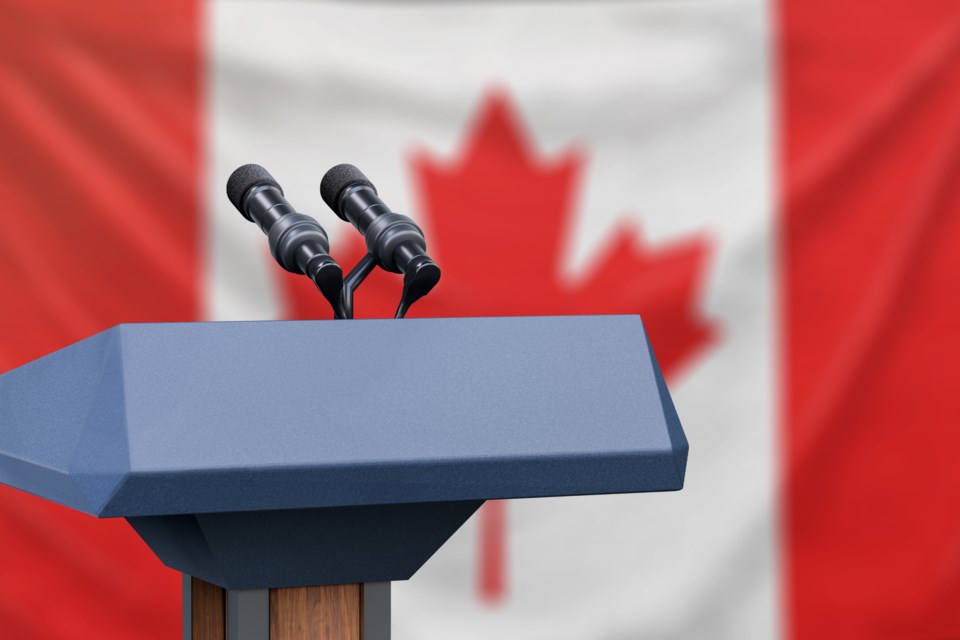In the environment I’ve occupied for four decades, it has never been this unstable and unsafe, this disabled and distrusted.
Our craft of journalism is facing a heightened physical threat, in part incited politically and enabled technologically, just for trying to do its job.
And we are not alone. The political system we scrutinize, imperfect but essential to our stability, is increasingly attacked and polarized. The reckless pitch of our political conflicts, assisted by the often anonymous and cowardly harm across social media, has reached unthinkable levels in this country.
We have long had political “war rooms” to discredit opponents during campaigns, but we have lately entered a stage in which it does not seem outrageous to endanger those in public life. Some of this we hear about, so much of it I suspect we don’t.
Last week, it was a social media post threatening the sexual assault of the wife of the federal Conservative leader.
On a local level, a strategist for the OneCity municipal party mused online about linking a rival to pedophilia as a way to get at him.
A couple of weeks earlier it was a visceral in-your-face rant to the federal Liberal finance minister.
A few months back, it involved anger and physical menace of a campaigning federal NDP leader.
Last election for the first time in memory, the prime minister’s campaign stops were cancelled out of public safety concerns.
Our public health leader in this province – our public health leader, for heaven’s sake – requires a security detachment.
Now, it isn’t as if some of this reputational mess isn’t self-inflicted. It was disheartening last week, for instance, to moderate a Vancouver mayoralty debate in which the most passion onstage – indeed, about the only passion – erupted over whether candidate Ken Sim was lying in asserting Vancouver would face a tax on driving and whether Kennedy Stewart was lying about his intentions to unfurl that tax. Their focus wasn’t on who had the best idea, but who could best call the other a liar.
This is what has degenerated politics at times: The manifesting of bogeymen, whether it’s the right-of-centre saying a left-of-centre leader won’t tell people about a tax, or the left-of-centre earlier saying a right-of-centre leader won’t tell people about his plan to curtail human rights.
After all, phony wars and make-believe menaces work because manufacturing fear is the ultimate short-term weapon in politics and media. Long-term, though, it disgraces them.
And if you’re wondering, yes, the media coverage of the mayoralty debate featured – what else? – the road tax argument. Journalism can self-inflict its problems at times, too.
No doubt, media need to accept responsibility for our legacy of limited inclusion and recognition in contributing to public discourse. Quite correctly, many feel their voices haven’t been heard, so it is not unexpected that their emotions will at times come out sideways as they search for validation. For a variety of reasons, the pandemic has produced more new enemies than friends of media.
The larger question is whether our leadership will honour its duty to defend even flawed institutions like the press as an integral element of a functioning democracy.
Earlier in September the new Conservative leader was hectored by a reporter at a news conference (who later apologized). Rather than defuse the situation or rise above it, Pierre Poilievre saw an opportunity for political sport, vilifying the journalist as a Liberal who invaded the event and converting the episode within hours into a fundraising plea to bypass media, as if somehow the truth was really his to offer. This game is not only silly but dangerous in what it signals as acceptable. He ought to understand he is not alone in facing personal peril; if he already does, then what he did is even more worrisome.
It took many clear, targeted threats to journalists – particularly to women and persons of colour – for news organizations earlier this month to write the prime minister to plead for measures to combat abuse, harassment and hatred.
The letter was long due. The presence of fake news and the casual vilification of responsible media have primed the pump for a broadened ignorance and subsequent cynicism about the reliable press. The prime minister’s response to the letter was heartening in its commitment to deal with the most serious of the problems, and of course he faces his own regular threats that we seem to have accustomed ourselves to and even accepted as a price of leadership.
The hyper-partisan quality of our discourse is reflected in strong public sentiment that politics are more divisive than unifying. People see the other side not as merely holding different opinions but as threats to our individual or collective rights, our environment or our socio-economic agency. The days of courteous, civil agreeing to disagree are gone. Rage is all the rage, liberated by technology in which a licence to say what you wish is confused with a more serious freedom to express.
Literature suggests online networks actually encourage moral outrage; the more it is expressed, the more it draws supportive “likes” from its audience, thus reinforced and encouraged.
Lost in this melée is what influence this climate has on anyone’s willingness to participate in public life. When the public is emboldened by Twitter to anonymously expel bile, when one’s private life is subjected to the microscope, when there appears little room for decorum in the arena, why would anyone trade for that life?
What we are left with are haggard recipients of incessant complaint and increasing disdain, whether in public life or in the craft that chronicles it, yet we strangely wonder why.
Enough, already. There has to be room for our better selves here.
Kirk LaPointe is publisher and editor-in-chief of BIV and vice-president, editorial, of Glacier Media.



